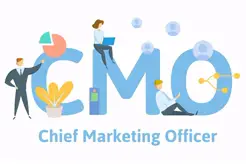Guide to Hiring a Chief Marketing Officer for Your Business
Much like many other professions, finding the perfect Chief Marketing Officer (CMO) for your business can be a daunting task in today's job market. Nevertheless, you can increase your odds of discovering the ideal fit by following a few simple steps.
Start by gaining a clear grasp of your needs, budget, and timeline. This article from Aniday provides step-by-step guidance on how to hire a CMO, offering you valuable insights on the process.

Who is a CMO?
The CMO is responsible for supervising and directing all marketing activities across the company. They must possess a comprehensive grasp of brand development, sales management, product and distribution management, as well as customer service.
Without a strategic marketing plan, your company might be spreading itself too thin. It's like running in five different directions simultaneously, which ultimately leads to standing still. Bringing a CMO on board provides the direction and focus needed for both your conventional and digital marketing endeavors.
Common Roles of a CMO
As outlined by Deloitte, every Chief Marketing Officer (CMO) plays four key roles:
-
Growth Driver: The primary responsibility of a CMO is to boost the company's revenue. Deloitte's interviews with CMOs revealed that 95% of them consider revenue as the foremost indicator of a company's growth.
-
Innovation Catalyst: In a constantly evolving marketing landscape, the CMO's role is to identify new marketing technologies and platforms, employ innovative strategies, and establish fresh partnerships to drive the brand forward.
-
Brand Storyteller: The CMO is tasked with creating compelling brand narratives that resonate with customers. Storytelling should be an integral part of the marketing strategy, connecting the audience with the brand.
-
Capability Builder: A CMO is accountable for nurturing various marketing channels, launching profitable marketing campaigns, and continually refining the firm's marketing strategies.

Daily Duties of a Chief Marketing Officer
A typical day for a Chief Marketing Officer (CMO) might involve the following:
Team Management
CMOs oversee their marketing team, which may encompass various roles like email marketing, social media, paid advertising, content creation, and more. This team can consist of in-house employees or freelancers.
The CMO typically reviews marketing plans and channel-specific growth strategies to ensure everything is running smoothly.
Reporting
Another crucial responsibility of a CMO is to provide regular reports to the chief executive officer (CEO) and the executive team. Typically, they should conduct weekly or biweekly meetings to evaluate the company's overall growth and marketing performance.
New Partnership Establishment
The CMO frequently serves as the Brand Ambassador and holds responsibility for establishing and overseeing new partnerships. These collaborations may encompass affiliate partnerships, joint webinars with other brands, profit-sharing agreements, public relations initiatives, and various other ventures.
Marketing Campaigns Analysis
Additionally, they play a role in analyzing marketing campaigns, including diving into campaign data. In smaller companies, particularly startups, CMOs might even be involved in hands-on campaign execution.
Sample Job Description of a CMO
In this section, we provide a sample job description for a Chief Marketing Officer (CMO), including detailed responsibilities and candidate requirements.
Job Brief
We seek an experienced Chief Marketing Officer (CMO) to lead and shape our marketing operations, crafting a strategic vision for success. In this role, you will manage a team of dynamic marketing professionals and drive our marketing endeavors to achieve excellence.
Our ideal CMO embodies a profound passion for their profession and possesses a comprehensive understanding of the marketing landscape. They skillfully harmonize practicality with creative business acumen, adeptly navigating intricate marketing endeavors.
The primary objective is to propel our company's marketing initiatives to surpass competitors and achieve remarkable success.
Responsibilities
-
"Listen" to market trends and lead company market research efforts.
-
Collaborate with various departments to ensure a unified approach to meet market demands.
-
Develop marketing strategies aligned with the company's overall objectives.
-
Create and oversee the implementation of a practical marketing plan.
-
Plan and coordinate marketing functions and operations (branding, product development, communications, etc.) to reflect the company's unique identity.
-
Design and execute promotional campaigns and PR initiatives across digital and non-digital channels.
-
Build and lead a high-performing marketing team.
-
Establish a strong network of strategic partnerships.
Requirements and Skills
-
Proven experience as a CMO or in a similar role.
-
Demonstrated ability to develop effective marketing strategies and business plans.
-
Strong grasp of market research and data analysis methods.
-
Ability to adeptly apply marketing strategies across both digital and traditional channels.
-
Understanding of various business disciplines (e.g., IT, finance).
-
Proficient in MS Office and business software (e.g., CRM).
-
A leader with a blend of creative and analytical capabilities.
-
Outstanding written and verbal communication skills, coupled with excellent interpersonal abilities.
-
Bachelor's degree in business administration, marketing, communications, or a related field; a Master's degree is a plus.
The steps to follow on the hiring process of a CMO
Step 1: Define Your Requirements
To determine your CMO's role:
-
Specify required marketing leadership experience.
-
Define their team management scope (in-house or freelancers).
-
Decide on their role in strategy development or execution.
-
Choose between full-time or part-time freelance CMO.
-
Consider their involvement with the sales team and sales enablement documentation.
Step 2 - Find Applicants
Begin by searching for applicants. As mentioned earlier, explore your network, utilize online platforms, and advertise the job in relevant online communities.
Step 3 - Assess Skills
Now, evaluate candidates' skills. Assign them a skills test, which could be a multiple-choice quiz, a task related to a specific online marketing channel, or a scenario to assess their interpersonal abilities.
Step 4 - Interview Top Candidates
Select the candidates who excel in the skills assessment and conduct interviews. Prepare interview questions in advance, inquire about how they handle various workplace scenarios, and assess their alignment with your company culture.
Tips on hiring the perfect Chief Marketing Officer for your business
An ideal Chief Marketing Officer (CMO) not only possesses the necessary skills but also aligns with your company's culture and boasts a proven track record of delivering measurable outcomes.
Throughout the interview process, it's imperative to assess their management and leadership style, technical and analytical competencies, communication and problem-solving abilities, as well as their openness to continuous learning. Candidates displaying deficiencies in organizational skills and communication should be avoided.
Below are some topics you should be asking a candidate applying for this position to find the best one:
-
Marketing Dashboard and KPIs: Ask about their key performance indicators (KPIs) to understand their vision of marketing success and how they convert metrics into results.
-
Approach to Branding: Inquire about how they manage branding amid differing opinions, emphasizing their ability to use data for decision-making.
-
CMO Challenges and Leadership: Learn about the challenges they see for a CMO and how they work with the executive team and marketing staff to maximize results.
-
Pricing Frameworks: Discuss their preferred pricing strategies and their grasp of complex pricing frameworks.
-
Market Research: Explore their approach to customer and competitor research, gauging their use of innovative methods.
-
Balancing Inbound and Outbound: Understand how they strike a balance between inbound and outbound marketing strategies.
-
Reflecting on Past Role: Ask what they would do differently if they could start their last role over, gauging their self-awareness and growth mindset.
-
Art and Science of Marketing: Discuss their perspective on the art and science of marketing, focusing on their strengths in this balance.
-
Revenue-Driving Strategies: Encourage them to propose revenue-driving strategies based on their understanding of your company.
Conclusion
Hiring a CMO often requires specific skills and expertise. However, by following the steps outlined in this Aniday article, especially focusing on understanding your needs, you know how to hire a CMO and ideally find the perfect candidate to position your business for success, both now and in the future.
Aniday's HR Services
Headhunting Service
Find and recruit quality candidates in just 1 week! Supported by 40,000 experienced headhunters in IT, Finance, Marketing… capable of recruiting in any region.
Headhunting Service ➔Employer of Record (EOR) Service
On behalf of your business, we recruit employees and handle payroll without the need to establish a company in markets such as Vietnam, Singapore, Malaysia, India, Indonesia…
Employer of Record (EOR) Service ➔

